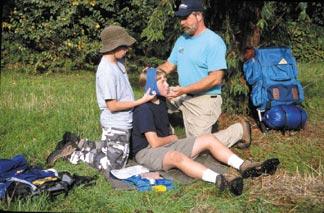 |
|
| Issue #46 • July/August, 1997 |
It was an argument about science. Dave and I were on one side, Dave’s friends Tom and Bill, though curiously nonallied, were on the other. I say nonallied because Tom is very religious while Bill is an environmentalist somewhat to the left of Hillary. And though they disagreed on other things, in this discussion neither of them had much use for science.
To summarize Tom’s position, he said science wasn’t any more valid than any other belief and he believed, quite frankly, in creationist theory. Bill agreed science wasn’t any more valid than any other belief, but the expression he used was that all beliefs are relative. He also was fond of qualifying everything Dave or I said with the phrase, “That’s your opinion.” You’ll never know how irritated I was getting.
In the meantime, O.E. MacDougal, Dave’s poker playing friend, sat in the corner reading. Every once in awhile he’d look over his book at us, but he didn’t join in the conversation.
Tom said, “Science is just like religion, it’s just a set of beliefs. It’s no more valid than any other set of beliefs.”
“There are no absolutes,” Bill added. “All systems of belief are relative.”
It was more than I could take, but I couldn’t think of anything to say except, “Mac, what do you think?”
Dave looked to Mac, too.
“Who’s that?” Tom asked looking into the corner where Mac sat reading. Bill had met Mac before and I don’t know whether Mac realized it, but Bill didn’t like him. If he knew, he didn’t care.
“It’s O.E. MacDougal,” Dave said. “Mac, meet Tomyou’ve met Bill before.” Then he turned to Tom and said, “Tom, meet Mac.”
Mac stood, crossed the room and shook Tom’s hand. “Glad to meet you, Tom.” Then he shook Bill’s, said “Nice to see you again,” and went back to the corner and started reading again.
“Well?” Dave asked.
Mac looked over his book.
“Have you been following what we’ve been talking about?”
“Off and on.”
“What do you have to say?” I asked. “Is science any more valid than religion or philosophy?”
Mac got a pained look on his face. I think he just wanted to read.
“Who’s this guy?” Tom asked again. He looked at Bill who rolled his eyes.
“A friend,” Dave answered. “I’d just like to hear what he has to say.”
“You want to join our little discussion group?” Tom asked.
It was obvious Mac wanted to be left alone, but he put his book in his lap and said, “Your comment begs the question of what you mean by the word ‘valid.'”
“There’s a nonanswer if I’ve ever heard one,” Bill laughed.
Mac smiled.
“What do you mean?” I asked.
“If I said a Cadillac is no better than a Honda, what would you say?”
“I’d agree,” I said and Dave and Mac laughed because I own a Honda.
“Then what if I said a Cadillac is better than a Honda?”
“I’d say, it would depend on what you meant by ‘better.'”
“Okay, then it depends on what we mean by ‘better.’ And when Tom said science is no more valid than religion, did you all agree to what the word ‘valid’ meant in that sentence.”
“I would imagine he meant ‘true,'” I said.
“Okay, then what are you measuring truth against.”
“Truth is relative,” Bill said.
“Then how are you guys using the word ‘relative’?” Mac asked.
“This isn’t going anywhere,” Bill said. “I think we all know what it means.”
“Why don’t you tell us how you define it?” Tom asked Mac.

When the Greek sity of Syracuse was invaded by the Romans, orders were that Archimedes, the greatest scientist of his time, was to be spared. But, engrossed in his work, he failed to acknowledge the demands of a Roman soldier who then killed him.
“This is your discussion. I shouldn’t be the one defining the terms.”
“The word ‘true’ is relative,” Bill said and Tom agreed saying:
“They’re words that mean different things to different people.”
“It’s not enough to just agree that ‘valid’ or ‘true’ mean different things to different people at different times. We also have to agree on what we mean by them at this moment in this discussion.”
“Tell us what you mean by it?” Tom said to Mac.
“I was hoping I could get you guys to explain how you were using ‘true’ and ‘valid’ in relation to science. I wanted to hear what you think science is because I don’t think you even agree on that.”
He looked at Tom. “What’s science to you?”
“It’s a secular opinion of how the world works, but just one of many ways of viewing the world.”
“What about you?” Mac asked me.
“I think it’s a collection of facts and data…and theories.”
He looked at Dave.
“It’s a way of proving things…proving theories.”
He looked at Bill.
“I agree with Tom when he says it’s one of many ways of looking at things.”
“See, it’s all relative,” Tom said.
“Well, I suppose there’s an element of truth in what each of you said. And, Bill, Tom, you two probably came the closest.”
“What do you mean?” I asked because I figured I’d come the closest.
“Science certainly depends on facts and theories,” he said. “And, using the scientific method, although we don’t prove theories, we provide evidence for them…”
“What do you mean we don’t prove theories?” I asked.
“Nothing is ‘proved’ in science. Among scientists, ‘proof’ is reserved for mathematical theoremsor at least it should be. All we ever do in science is provide evidence for a theory.”
“That’s not the way I learned it,” I said.
“And that’s another problem,” he said.
“What problem?” Dave asked.
“The way we learn about science in school and the way we’re informed about it in the press.”
“But what about truth?” I asked.
No truth in science
“There is no ‘truth’ in science. Either theories have evidence to support them or evidence supports the idea that a theory is an inaccurate view of reality. But even if the evidence supports a theory today, tomorrow, new evidence may show the theory needs revision. It happens all the time. That’s what happened with Isaac Newton’s theories of mechanics and universal gravitation. For a couple of centuries all the evidence seemed to show his theories explained the universe precisely and were deemed ‘true.’ But in the late 19th century evidence started to accumulate that disturbed scientists. They were discovering phenomena Newton’s theory didn’t account for. It was in explaining how these new pieces of evidence, as well as other ideas, fit into a more comprehensive theory that Albert Einstein made his mark. And Newton’s theory which had appeared to be ‘true’ for so long was finally shown to befor lack of a better worduntrue. Now Einstein’s theory is the new ‘truth.’ But even his theories may fall by the wayside, and Einstein himself once said that no amount of experimentation would ever prove his theories were right, but just one experiment could prove him wrong.”

Isaac Newton, though a loner throughout his life and a religious eccentric late in life, did more to influence civilization with this inventions of calculus, his theory of universal gravitation and his laws of motion than any other man ever to have lived.
“Then you’re saying science is just a bunch of opinions,” I said.
He shook his head from side to side. “Science is a process…it’s a method.”
“Science is just a western invention,” Bill said.
“That’s right,” Mac said offhandedly.
“What?” I yelped.
“Well, it is,” Mac said.
“How can you say that? That’s not what I was taught…” I was getting pretty loud.
“Calm down, John,” Dave said.
“It’s an invention of western civilization,” Mac said. “It’s a way of looking at the universe. It’s a philosophy with a set of rules just like any other philosophyor religion. But,” and he hesitated on the word ‘but’ to add emphasis, “it happens to be the most spectacularly successful philosophy ever devised for interpreting reality…”
“That’s your opinion,” Bill interrupted, but Mac continued:
“The reason is, when a scientific theory doesn’t correspond to reality, the scientist assumes the theory is wrong and he attempts to modify it or he goes out to look for a better theory. In contrast, when a religious, political, or philosophical doctrine doesn’t correspond to reality, all too often it’s evidence that is assumed to be wrong.”
“That’s baloney,” Tom said.
“Give us an example,” Dave said to Mac.
“Well, for example, creationists have seen the fossil record and it doesn’t agree with their view of how the world came about. So they’ve decided to keep their ‘theory’ and pronounced the fossil recordwhat is otherwise called evidencewrong. They’ve questioned radioactive dating and said dinosaurs were simply antediluvian animals that weren’t taken on the ark and therefore were drowned. They’ve even suggested fossils aren’t real, that they’re just a test God has put there to see if he can bring on doubt. One even told me they’re one of God’s jokes.”
“Radioactive dating is just statistics,” Tom said.
“Just statistics,” Mac said. “That’s another issue we’ll have to consider…”
“But from the scientific point of view, isn’t evolution accepted as true?” Dave interrupted.
“No. But it is considered fairly accurate. There’s a lot of ‘evidence’ supporting evolutionary theory, but Darwin’s view of it is now being questioned. He proposed evolution was more or less constant with new species gradually emerging through random selection. But the fossil record doesn’t always support this. Some evolutionists are proposing that evolution may reach periods of equilibrium where nature appears to become balancedwith some gradual evolution, as Darwin believedbut that most evolution is due to catastrophic conditions that have punctuated life on earth.
“A good example would be that at the end of the cretaceous period, dinosaurs and other animals were living in a world that had reached a fair amount of equilibrium. There’s evidence that evolution was progressing slowly in response to changing environmental pressures such as the slow shifting of the tectonic plates. Then, some environmental catastrophemost likely a comet or an asteroid colliding with the earthchanged everything. The dinosaurs abruptly disappeared and with all of these higher niches now empty, the survivors started rapidly evolving to fill them.”
“But you’re not saying evolution is in question with those guys; it’s just a question of whether or not to modify Darwin’s theory based on the fossil record,” Dave said.
“That’s right,” Mac said.
“There are plenty of scientists who disagree with evolution,” Tom said.
“I’m not sure what ‘plenty’ means,” Mac replied. “But I think you’re talking about creationists. And the fact is, they may be right. But what creationists are practicing is not science, but religion.”
“I beg to differ with you. Some of them are eminent scientists.”
“I didn’t say they weren’t scientists. I just said they aren’t practicing science when they say those things.”
“Oh, come on,” Tom said.
Bill caught Tom’s eye. He smiled and shrugged.
“Wait a minute, what do you mean by that?” Dave asked Mac.
“That’s why I said we should agree on a definition of what science is.”
“What’s your definition of science?” Dave asked.
“The word science is used to describe a lot of things. Everything from, ‘there’s a real science to making a good apple pie’ to describing how physics is conducted in a laboratory.”
“See, I told you; it’s all relative,” Bill said.
“But I prefer to use the word science when the scientific method is involved,” Mac added.
“And scientists don’t make their assessments based on religion,” I said to Tom and I was a little bit startled when Mac looked at me and shook his head sideways.
“That’s not quite true, John. Einstein, the greatest scientist of our century, rejected quantum mechanics, which is one of the cornerstones of modern science and one of the most spectacularly successful theories in history. He rejected it on religious grounds because it introduced uncertainty into physics. What he said was, ‘I shall never believe that God plays dice with the world.’
“And Isaac Newton, perhaps the greatest scientist who ever lived, rejected a relative universeone in which motion is relative to the observer, meaning there are no absolute reference points that indicate one’s ‘true’ position in the universeon religious grounds and thereby missed out on one of the two cornerstone postulates of Einstein’s Restricted Theory of Relativity.”
“What’s relative motion got to do with religion?” Tom asked.
“Newton couldn’t accept that all motion is relative, that there isn’t an absolute reference frame against which all objects in the universe move because the position of God in the universe was absolute and not relative. It was a holdover from the days when heaven was fixed and the earth was thought to be the center of the universe.
“But neither Einstein nor Newton based their assessment on science. Yet, either or both of their statements could be true because there’s no ‘proof’to use the p-word againto say they were wrong, even though there’s a lot of evidence indicating they were.”
“I’m kind of confused,” Dave said. What’s this scientific method and who came up with it?”
Mac thought a moment.
The origins of science
“In fact,” Dave interrupted, “science seems to be pretty new. Why don’t we hear about scientists from like a thousand or two thousand years ago?”
“That’s a good question. Let’s start with where science and the scientific method came from first, because it’s actually kind of interesting. What do you guys know about the history of science?”
“I suppose he’s going to tell us,” Bill said.
“I’d like to hear it,” Dave said.
“I’m interested,” Tom added.
I just took notes.
“Well, you yourself said modern science is a western invention,” Mac said to Bill. “But the rudiments of that science were shared by all societies and, in particular, all early civilizations. Certainly some sort of rudimentary agricultural science had to be developed to allow men to plant and harvest; and math, the so-called queen of the sciences, had its origins lost in antiquity. And all civilizations seemed to have studied astronomy.
“But it’s worth noting that even though today we think of science, religion, and philosophy as separate issues, back in those times the three were one. For example, no one studied astronomy without considering the religious aspects of it.
The scientific method consists of just a few steps but it applies to any field of science. These steps are:
1. Observe phenomena.
2. Formulate a theory to explain the phenomena.
3. The theory should encompass something greater than just the observed phenomena.
4. The theory should allow previously unsuspected phenomena to be predicted.
5. The theory should be testable through experimentation by anyone else possessing the necessary equipment.
“The stone structures that dotted northern Europe, for instance, of which the most famous is Stonehenge, were astronomical observatories with the capability of marking the equinoxes, the solstices, and predicting both solar and lunar eclipses. Building them required a level of mathematical and astronomical sophistication that would not reappear in that part of Europe for centuries. But these were more than just observatories, they apparently also had deep religious significance for their builders.”
“But the sophistication for building those things was lost?” I asked.
“Yes, not to reappear for thousands of years. In fact, it’s ironic that though modern science was invented in the west, throughout history the west usually trailed behind the rest of the world. In particular it lagged behind China.”
“The Chinese were ahead of us scientifically?” I asked.
“In both science and technology they were ahead of us for centuries. For example, today we consider the ancient Chinese such reliable observers of astronomical events that it’s their records we go to when we want to verify the reporting of celestial eventslike comets or the sighting of supernovasby ancient observers in the west.
“Still, with very few exceptions, like the invention of the calendar, science had very little practical use or impact on people’s lives.
Archimedes
“But there was at least one bright spot in the ancient western world and, if someone wanted to say the beginning of modern science started with the man they called Archimedes, I wouldn’t argue.”
“I’ve heard of him,” I said.
“He was one of the most brilliant men who ever lived,” Mac said. “He made contributions not only in pure mathematics and geometry but in mathematical physics. He almost invented integral calculus. His formulations on the laws of the lever, his invention of the compound pulley, his work with hydraulics, optics, the densities of materials…” Mac threw his hands up. “…all kinds of things, though elementary in today’s science, were quantum leaps over his predecessors. The world would have to wait 1900 years, until Newton, to see a comparable genius.
“In his own time, his renown was such that, when the Romans captured the Greek city of Syracuse, where he lived, the soldiers were told that at all costs Archimedes was to be taken alive. He was, quite frankly, one of the most important men in the world. But one soldier coming across an old man demanded his attention. The old man ignored him and kept doodling figures in the sand with a stick. The soldier killed him on the spot.”
“And that was Archimedes?” Dave asked.
“Sure was.”
“Modern science should have started right there with Archimedes. But it didn’t. In fact, it seems the world went downhill. There were brilliant men, lots of theories, and many technological advancements. But very little advancement in scienceat least in Europe.
“During the so-called Dark Ages, technology continued to progress in Europe but science itself languished. In the meantime, in the emerging Islamic empire, science and mathematics were not ignored. In particular, the Moslems developed algebra. It’s hard to imagine modern science arising without algebra. Calculus, as invented by Newton and Leibnitz, would have been impossible without algebra having been invented first. And without calculus there is no modern physics, no modern electronics, no modern engineering feats.
“Why did the Moslems share their knowledge with the Europeans?” Dave asked.
“They didn’t. When they were finally forced out of Western Europe, they left behind their libraries. It was when European Christians went through those libraries, with the help of Jewish translators, that Europeans rediscovered the works of the Greeks and early Romans. In particular, they rediscovered Aristotle and Archimedes.
“They also discovered a concept developed in India that the Moslems found useful. It was a concept unknown in the west until then. It was the concept of the number zero. And along with zero came the Hindu numbering system, which we call Arabic numeralsour common 1,2,3,10, 20, 100, etc.that made calculations easier. Until then, Roman numerals were used. Quick, what’s MCM times DLI? Roman numerals were not easy to calculate with.
“But this all happened at just the right time because a great new period of culture and learning was starting in Europe.”
“The Renaissance,” I guessed.
“That’s right. It was a time of tremendous technological, artistic, and cultural advancements. But even then, science was still treated like any philosophy. And the ‘proof’ of a scientific theory was not experimentation; it was still, ‘Does it appeal to reason?'”
“It seems if science and philosophy were still tied into religion, that since they didn’t test theological theories with experimentation, it wouldn’t occur to them that it might be necessary to test theories about the physical world,” Dave said.
“And that’s part of the reason they didn’t test them.”
“There was more to it?” I asked.
“Sure. What stood in the way of the early Renaissance men were the same things that stood in the way of men in Archimedes’s time, and it ensured that until the Renaissance men were observers and weren’t inclined to set up experiments to see if a theory was correct. The problems were:
“One: There was a lack of tools and measurements. For example, there was no way of measuring time accuratelyno stop watches. Also, there were no microscopes or telescopes. There was just a real shortage of tools.
“Two: There was a lack of sophisticated math. Modern science depends heavily on mathematics for modeling, for calculations, and for analyzing data.
“Three: There was also a lack of previous science to build on. Those we would call the scientists of ancient timesthe astrologers, alchemists, mathematicians, and what have youkept their discoveries secret and often died without revealing them. So whatever they discoveredprocesses, chemicals, even mathematical techniqueshad to be rediscovered over and over again by later generations.
“But with the Renaissance, new tools were invented. Mathematics advanced, especially after Newton. And men began to publish, so knowledge was shared.
Robert Boyle
“Still, experimentation wasn’t common. Not until the 17th century when an Irish-English chemist named Robert Boyle came along. Others before himGalileo, Kepler, Newton, and otherssometimes referred to the real world to make observations and show some statement was valid, but Boyle did something that confounded his contemporaries: He assiduously conducted experiments to verify all of his theories. To his contemporaries, Boyle was a little odd because to them reason was still more important than experimentation. But Boyle had tremendous success in science with his methods and is today considered the founder of modern chemistry.

Robert Boyle confounded his contemporaries by insisting theories should be verified by experimentation.
“He designed laboratory equipment including the gas pump, and formulated a theory of gases that now bears his nameBoyle’s law of gases. He was the first to observe that something in the air, namely oxygen, combined with materials as they burned. He also discovered that metals gain weight when they oxidize. He made important discoveries, but more importantly he was one of the first proponents of this new scientific method.”
“And what is that method?” I asked.
“I think you can guess.”
No one said anything.
The scientific method
“But I’ll tell you. This method, more or less, is what propelled western scientists ahead of the rest of the world, and it is the basis of how science is conducted around the world today. You can break it into five parts.
“First: Observe phenomena. For example, notice things such as when you crossbreed red and white flowers that a certain number of the offspring are red, a certain number white, and a certain number pink. Or notice how planets seem to cross the sky relative to the fixed stars. Or note how animals seem to change to adapt to their environment.
“Second: Construct a theory that explains why these things act the way they do. A really good theory will be reducible to a few easily understood axioms. One of the most famous theories to emerge in the 20th century is Einstein’s restricted Special Theory of Relativity. Relativity rests on just two axioms: (1) the speed of light is constant for all observers, and (2) all motion is relative. Starting from here, Einstein explained a lot of things that puzzled 19th century scientists, including why the speed of light seemed the same to everyone.
“Third: A really good theory will relate phenomena not previously thought to be related.”
“In other words,” Dave said, “it will be a more encompassing theory.”
“That’s right. In the 19th century, astronomers noted irregularities in the orbit of Mercury that led them to believe there was an undiscovered planet revolving around the sun inside the orbit of Mercury. But since no planet was detected, it was assumed the planet must lie so close to the sun that it was lost in its glare. Einstein pointed out that such a search would be fruitless because he could explain Mercury’s orbital shift, called a precession, with his theory. In fact, he showed that all the planets precess in the same way Mercury does, but since the planets further out move slower in their orbits, the precession was less and hadn’t been noticed.
“But the result was that a theory, that is, Einstein’s Special Theory of Relativity, that seemed to be only about light precisely explained the precession in the orbits of planets.
“Fourth: A great theory will predict the existence of heretofore unobserved or unsuspected phenomena, and Einstein, in his Special Theory of Relativity, explained there was a connection between matter and energy. That’s the famous e=mc2 equation and from that comes the atom bomb and nuclear energy. These were things no one else had anticipated. Later on, in 1916, when he published his General Theory of Relativity, he predicted that gravity would ‘bend’ light, something that apparently hadn’t occurred to anyone else up to that time, and sure enough, during a solar eclipse of 1919, astronomers measured the apparent bending of light as it passed near the sun, and the bending was exactly what he predicted.”
“So what you’re saying is that a theory should do more than just explain the observations and data at hand; it should reveal new information,” Dave said.
Mac nodded.
“Fifth: The scientist should suggest experiments that test the theory, but more important, the independent observers should be able to conduct experiments that test the validity of the theory, and the results of the experiment should be reproducible by every experimenter who tries them. For example, Einstein’s theories can be verified by anyone with suitable equipment, and the outcome of those experiments are not, with all due respect to you, Bill, a matter of opinion.”
“Isn’t that what happened to those guys up in Utah who claimed to have discovered cold fusion?” Dave asked. “They were finally discredited because too many other scientists couldn’t duplicate their results.”
“That’s right. But until the invention of the scientific method, what was the litmus test of a theory?” Mac asked.
No one answered.
“It was whether or not it appealed to reason?’ No one said, ‘Let’s do an experiment and see if it works in the real world’. It was simply: If it sounds good, it must be true.
“And although we now live in the days of modern science, an awful lot of stuff goes around whose only validation is that it fits into that person’s political or religious philosophy, and it leads to bad science.
“A case in point comes right from this century. In the old Soviet Union, there was a man named Trofim Lysenko. He claimed biological traits were environmental instead of inherited. This theory fit in with Communist theory because the communists maintained that by changing the political system, the nature of people would change. As a means of demonstration, he claimed that by feeding generations of white mice a steady diet of rice, succeeding generations acquired Oriental traits including the so-called slanty eyes, yellow skin, and even stereotypical Oriental behavior. He also claimed he could change wheat into rye or oats by changing its environment.
“No one in the west could duplicate the results of Lysenko’s experiments. And, in the Soviet Union, biologists who disagreed with the results of his ‘experiments’ could lose their jobs and many were imprisoned. Some were even shot.
“But in the rest of the world, where science had at least some integrity, because his experiments were not reproducible his theories were ignored.
“And that, my friends, is what science really is. It’s not a set of dogmas or beliefs, or facts, or theories. Facts can be mistaken, scientific theories can be overthrown, but the method reveals how the real world works, and in that way it’s different from religious and philosophical theories. And that’s also my measure of validity and truth.
“The scientific method is no longer just a part of western civilization; it’s been embraced by the worldProtestants, Catholics, Jews, and Buddhists; Africans, Asians, Europeans; men and women; anyone who wants to become part of the modern world. They’ve done this because it works. It’s changed the world more than any other idea ever has.
“The shame is that people get a public school education, leave high school, and don’t have a clue as to what science is. In fact, I think it would be fair to say that most so-called educated people don’t know what it is.
“I think that science teachers in grade school and college should, at the beginning of every semester, write on the board what science is and keep coming back to it as they teach, because even though you may not be able to understand what the Theory of Relativity means, the meaning of the scientific method is within the grasp of everyone, and, at its barest, it’s what science is all about.
No one said anything for a moment, so Mac picked up his book again.
But Dave said, “So ‘true’, from a scientific point of view would be ‘can a theory withstand experiment to see if it concurs with reality?'”
Mac looked over his book again. “That’s right. That’s what experimentation does. And anything that hasn’t been tested is open to scientific question, and anything that can’t be tested experimentally doesn’t fall under the domain of science.”
“What wouldn’t fall under the domain of science?” Dave asked.
“An example of the kinds of things that no one has been able to subject to scientific experimentation are the existence of black holes in outer space. We’re pretty sure they exist, but no one has yet conducted an experiment to show they door even could. Another example would be the graviton, which would be the particle that would be responsible for gravity. It probably exists, but no one has shown experimentally that they do.
“On the other hand, an example of something that it may be impossible to demonstrate scientifically is the existence of God. This doesn’t mean that God doesn’t exist; it means his existence is beyond the reach of scienceat least today and perhaps forever.”
“The thing that bothers me about science,” Tom said, “is that so much of it is based on statistics.”
“What’s that mean to you?” Mac asked.
“Well, everyone knows statistics are inaccurate and it’s so easy to lie with them.”
“Mark Twain said, ‘There are three kinds of lies: lies, damned lies, and statistics,” Mac said.
Tom smiled.
“Tom, statistics is one of the best formulated and most studied branches of mathematics, and it’s the only tool that exists for handling large amounts of data from the real world. If there’s a better way, with a better track record than statistics has shown, then everyone in science wants to hear what it is. Because of its very nature it can lead to erroneous results, but scientists are aware of this so it’s one of the reasons tests are conducted again and again. But because it has been phenomenally successful, it’s one of the most powerful tools available to scientists.
“And the fact that people use statistics to lie isn’t the fault of statistics. Generally they get away with it because people are so ignorant of statistics.”
“So that’s it,” Dave said. “The scientific method.”
“That’s it,” Mac said.
“Do you think there’s intelligent life on other planets?” Dave asked.
“I’m not sure there’s intelligent life on this planet,” he said.
Tom and I laughed and Mac added, “Actually, I think there probably isintelligent life on other planets, that is.”
“Do you think their science would be far ahead of ours?”
“Some would be more advanced, some wouldn’t. But what would be more advanced is their technology and what they’ve discovered about physics, biology, medicine, and what have you. But I think their method of conducting science would be just like ours. I can’t imagine anyone ever coming up with a modification that improves on it. I’m not saying it’s impossible. I just doubt it.”
“Well, I’ve got to say I feel a little better about science,” Tom said.
“What do you mean?” I asked.
“Well, it doesn’t seem as much at odds with religion the way Mac talks about it.”
“What do you mean?”
“I’m a religious man, John, and most of the time, when I argue with people who are not religious, they use science to try to bash religion. But, as Mac pointed out, science isn’t at war with religion at all. It’s just a method for discovering things about the natural world, and I would guess that things which are outside the realm of science, like God, are okay to have as matters of faith.”
He looked at Mac and Mac said, “That’s the way I’d think of it.”
“But there is now a growing problem with modern science,” Mac said. It’s that what it reveals about the modern universe is becoming inaccessible to the modern educated man. To understand a lot of it, specifically in physics, you must be a mathematician.”

Albert Einstein is the best known scientist of the 20th century and he was the first man to successfully challenge Isaac Newton’s theories.
“What do you mean?” Dave asked.
“If you wanted to understand Aristotle’s view of the world, all you had to do was read Aristotle. To understand Hume, Kant, Descartes, or the Christian view of reality, you do the same thing. But to understand modern physics, you have to know how to work with calculus, differential equations, abstract algebras, and who knows what else; perhaps even topology and parabolic or hyperbolic geometry.”
“You sound as if you’re speaking Greek,” I said.
“I disagree,” Dave said to Mac. “Give me an example of something I can’t understand without being a mathematician.”
“What happens to time as you approach the speed of light?” Mac asked.
“It slows down.”
“Why?”
“What do you mean, ‘Why?'”
“What’s the mathematics that led Einstein to conclude this?”
Dave didn’t respond.
“If you can’t answer that, then you have no more than a layman’s understanding of why it’s so. In fact, it’s just an article of faith with you. If another scientist were to announce in tomorrow’s news that he’s modified or overthrown Einstein’s theories, would you be able to follow his reasoning and determine whether or not you agree he’s done it?
“If not, you only have a layman’s understanding of the theory.”
“So what’s your point?” Dave asked.
“Your adherence to Einstein isn’t much better than the creationist’s view of the universeexcept for one thing.”
“What’s that?”
“I was hoping you could tell me.”
Dave thought a moment. “Because,” he said, “I know Einstein’s theory has, at least until now, passed through that meat grinder we call the scientific method and has not been found
wanting.”
“That’s right. You know some scientistand probably a whole cadre of themhas experimented with it.”
“Okay, I see your point,” Dave said.
“The success of science as a way of ‘knowing’ the universe has been staggering when compared to all the competing methods. Science is going to continue to change the way we understand the universe, and it will continue to change the way we live. Science is not going to go away, and those who want to ignore it are simply going to be left out of the best part of the modern world,” Mac said.
He picked up his book and continued reading, and Dave and I went back to work. But Tom and Bill got into another conversation. They talked about religion and pretty soon it was an argument.
Mac kept his nose in his book until Tom turned to him and asked, “What do you think, Mac?”
Mac closed his book and stood up.
“Where are you going?” Dave asked.
“Fishing,” he mumbled while shaking his head, and with that he picked up his fishing rod and left.














